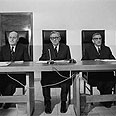
Declassified documents reveal failures of Yom Kippur War
New testimonies from Agranat Commission reveal miscommunication, intelligence that fell between the cracks and lack of clear protocols led to major failings in days leading to Yom Kippur War
Marwan also demanded to meet with Zamir urgently. "We had never had a telegram like that," Eini said in his testimony before the Agranat Commission. He meant a telegram in which a source made sure that the head of Mossad would come to meet with him, noting that he had very important matters to discuss. "I understood it to be a warning that there would be a war."
Related stories:
- Nixon in '73: Stop obsessing over Israel
- State to close case against former IDF intel chief
- Yom Kippur War: Cabinet rejects call for preemptive strike
And yet, the political echelons in Israel failed to realize the importance of the telegram and the danger it warned of. Now, 39 years after the Yom Kippur War, the Defense Ministry (through the IDF archives and defense establishment) published classified testimonies given before the commission which was founded to investigate the failings of the war.
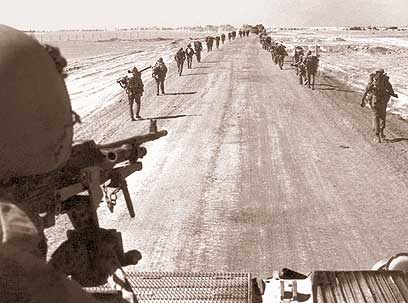
Soldiers in Suez Canal in 1973 (Archives)
Eini, as well as then Prime Minister Golda Meir's military secretary Yisrael Lior, were demanded to explain why critical intelligence pointing to the fact that war was about to break out was delayed and how a warning from the Mossad's most important source of information was kept from the prime minister.
The fact that the agent was Ashraf Marwan, the son-in-law of then Egyptian president Gamal Abdel Nasser has already been revealed in the past few years. Marwan fell to his death five years ago in mysterious circumstances.
After receiving the telegram (codename "chemistry") Eini decided not to wait until morning and to wake Zamir immediately. "I called him right away, gave him the gist of the telegram, he heard, said thank you, ok and (said) I should come see him in the morning."
Marwan had previously warned of an upcoming war, the alertness level was raised – and nothing happened. But this time, "The Angel" wanted a meeting.
The aide rushed to get Zamir a flight and called him once again to give him an update. "The Mossad chief took the opportunity to tell me that the head of Military Intelligence called him and discussed the fact that the Soviets were preparing to leave Syria.
"I told him that what the Military Intelligence chief said to him fit with information I had given him and then I found out that the Mossad chief didn't fully understand my first message. What I mean is, he was most likely half asleep and didn't grasp that I had told him about a warning of imminent war.
"He said that if that was the case he would call the Military Intelligence chief again and tell him. Explain that it was actually a serious situation."
According to Eini, the information from Military Intelligence about the Russian scientists leaving Syria together with Marwan's intel, convinced him that there was no other possibility.
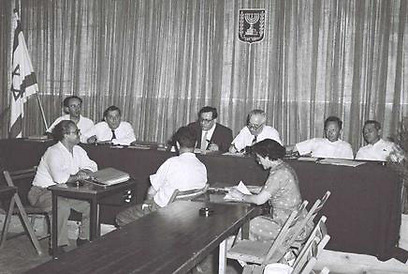
Agranat Commission (Archives)
"I thought it was a warning of an imminent war, especially when the Mossad chief told me about the Russian families leaving. I had no doubt, which is why I told him again."
If so, commission member and former Chief of Staff Yigal Yadin asked, why did the Mossad not pass on the urgent telegram to Golda Meir's military secretary Yisrael Lior? Eini said in response that Military Intelligence received the information.
"There was a set procedure with anything relating to information received from --- you do transfer it to the prime minister but it can take a few hours. I never thought to wake Lior at night."
Eini stuck with protocol and said that he called the military secretary in the morning, but he was in a meeting. "I left a message for him to call me as soon as he was out. Lior called before lunch and said that the cabinet held a meeting during which the prime minister heard that the Mossad chief had flown out of the country.
"During our conversation Lior said it would have been better had I taken him out of the cabinet meeting rather than waiting for him to become available."
Yadin then asked: Was there no fault in the procedure when a piece of information like this doesn't get to the prime minister and defense minister?
"Presenting the information to the prime minister was not intended for operational purposes; it seemed unnatural for me to wake Lior in the middle of the night. I'll wake Lior to tell him of a possible terror attack, which lies within his jurisdiction," Eini answered.
The theory alleging that Marwan was a double agent has been a major controversy within the intelligence community for decades – a theory which then Military Intelligence Chief Eli Zeira still believes – it was also an issue raised during Eini's testimony.
Yom Kippur War (Archives)
On December 6, 1973, two months after the war, Brigadier General Lior presented his testimony before the commission. The questions addressed to Lior focused on whether precious time was lost from the moment the warning about the war came in.
According to Lior, even when Meir was abroad days before war broke out, he made sure to pass on all the sensitive information in light of the situation.
"It gets to her by hook or by crook?" asked Laskov. "Yes," Lior responded. "If we think it's necessary, then it gets to her quickly."
Lior told those present of information he gave to Meir two weeks before war broke out. The intelligence pointed to the fact that Russia was transferring Scud missiles to Egypt. That was the first clue to the fact that war was imminent.
"You know that we recently received reports of 300-kilometer range missiles," Lior read out from the protocol of a conversation between himself and the prime minister to the commission members. "These are probably Scuds, this has been confirmed. Between 100 and 300 kilometers, it has nuclear and chemical warheads."
Commission member Nebenzahl was shocked to hear this: "That's what it says? I want to be sure." "It has chemical and nuclear warheads," Lior reiterated, adding: "I have to say, I was surprised that the Russians would do that," he quoted Zamir from the meeting.
According to the military secretary, Zamir warned Meir that this was a clear escalation. "There are signs pointing to the fact that they are already in or on their way to Egypt. Prime Minister, are we talking to --- about this?" Zamir asked. He most likely meant the Americans.
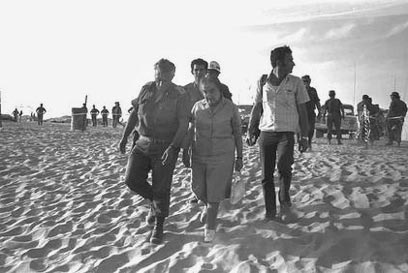
Golda Meir, Ariel Sharon in Sinai during war
The missile transfer, Lior believed, had dramatic implications vis-à-vis Egypt's future intentions. "The Egyptians and the Arab countries claimed over the years that since the Six Day War their problem was that they could not hit out against us deep in our territory, their problem was depth.
"Penetrating deep into (Israeli) territory is difficult, there were arguments. I won't go into that now; I'm not here instead of Eli Zeira and Zamir." Lior then went on to read portions of the meeting protocols . According to Lior, Zamir estimated that this was part of a "master plan."
On September 30, Commission member Yadin notes, the CIA asked Israel for details with regards to the Military Intelligence alert on a Syrian war plan. Who approved the final response? Yadin asks Lior. Were the prime minister or defense minister aware of the question, or did Military Intelligence respond independently?
"I believe that 99% of assessments are done periodically. It is done through the services without the military echelons giving any guidance," Lior claimed.
At no point, says the military secretary, did Meir hear various assessments vis-à-vis military information. "In most cases she received the final intel; she did not hear about disagreements or alternatives… I don't remember anyone coming to her in one way or another and saying – I'm against this."
Former Chief of Staff Haim Laskov asked whether Mossad Chief Zamir expressed his opinion to Golda in the days before the war. "Do you recall in that period, lets say, from After Rosh Hashanah, that the Mossad chief put his weight behind (the information) and told the prime minister …we're heading towards war?"
Lior responded in the negative. "On October 4," Lior said, "one day before the report about Russian families leaving Syria and Egypt there was a meeting where he was updated on the situation by a colonel who took the place of the Military Intelligence chief, who presented the situation as Military Intelligence saw it, that there was low probability for war. The Mossad chief did not address it."
According to Lior, the Military Intelligence assessment was always considered to be decisive.
"Even in the most difficult hours, which was during the sixth day, every assessment or consideration was always built on Military Intelligence's assessments. On that day we transferred a final assessment to the Americans that it was going to happen, the assessment was from Military Intelligence."
Eini's testimony also focused on the warnings that failed to make it to the prime minister's desk. Yadin notes that on October 1 he received a telegram regarding Syria's attack plans and the next day more telegrams arrived, strengthening fears that Syria was planning an attack.
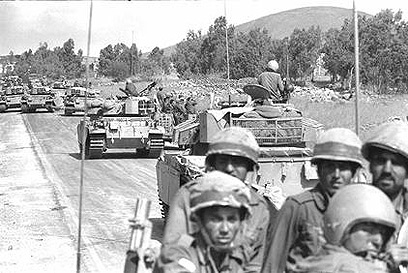
Yom Kippur War (Archives)
None of them stressed the former chief of staff, were brought before Meir's military secretary. "None of these telegrams?" Asks Commission Chairman Justice Agranat. "Not one," answered Yadin.
According to Eini, the criteria for transferring raw intelligence to the prime minister was "things that the Mossad chief believes could interest her personally, not because it could have an effect on anything operational.
"That's how I understood it. If we look at these files, take two to three months before the war, it would seem that hardly any of the reports on the matter of strengthening forces, purchases or preparation for war were brought before the prime minister."
Eini added that he held daily phone conversations with Lior: "Those calls included transferring information."
Yadin: "We asked Brigadier General Lior - I didn't know he didn't receive it – what his and Golda's response was to the telegrams. And he says: I'm hearing about these telegrams for the first time in my life."
The protocol, notes Yadin, was that the prime minister be given raw intelligence on any important report. "Post factum we discovered that the telegrams were transferred as raw material by Military Intelligence to the defense minister and chief of staff but for some reason they were not included in the Military Intelligence briefings."
According to Eini, the Mossad is not the correct pipeline through which the prime minister should be updated on certain matters, rather it is there to clarify things. "When someone reads a briefing, then the raw material, he understands the briefing a little better because the raw material includes additional details."

Yom Kippur War (Photo: David Robinger)
The fact that Military Intelligence received the information and then failed to include it in the final briefing is what, according to the Mossad chief's aide, caused a loss of sensitive information.
"It created a situation where something slipped through the cracks," Yadin said, wondering how it was possible that in light of the sensitivity of the intelligence and the urgency of the warning, no Mossad personnel noticed that the intel supplied by the source was missing from the Military Intelligence briefing.
"I'm not examining whether Military Intelligence transfers this kind of intelligence or another to the prime minister, I know that Military Intelligence, according to my estimation, passes on all the material we transfer to them to the prime minister.
Commission member Justice Moshe Landau: "As always, you relied on intelligence assessments carried out by Military Intelligence as the assessing body?"
Eini: "Not assessment, processing (of intelligence). We assumed that whatever we transfer gets to the prime minister."
This, claims Yadin, is where the roots of the intelligence fiasco lie. According to Yadin "this creates a doubly dangerous situation. Everyone relies on the Military Intelligence assessment, which is already not good.
"And here we discover that apparently distributing reports, not just assessments, should the information come to the prime minister's ears, are also under the jurisdiction of Military Intelligence, sharing reports – not assessments."
So did the Mossad cave to the low probability concept? Yadin tells Eini that according to documentation before the commission members, two months before that, in April 1973, when the source warned of a possible war which led to a raising of the alertness level in the IDF, the Mossad did transfer the raw intelligence to the prime minister directly. "What was the difference between this document and the previous one?" Yadin asked. "I cannot tell you why," Eini responded.
- Receive Ynetnews updates directly to your desktop











